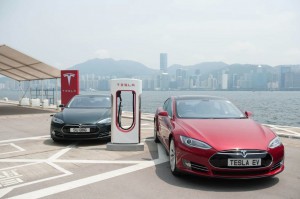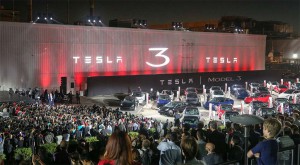
Tesla is working on a deal to build its vehicles in Shanghai, which may get accelerated if China eases ownership rules for EV makers.
Tesla Inc. increased its borrowing capacity for a car lease program to $1.1 billion from $600 million, according to a regulatory filing.
The increase in borrowing capacity will give the Tesla the ability to offer consumers better lease deals as it scrambles to break bottlenecks that have dogged production of its newest and most affordable vehicle, the Model 3.
The company increased the borrowing capacity under certain warehouse loan agreements, which are specialized loans to help companies finance inventory, the company said in a filing and a spokesman said financing was related to Tesla’s car lease program.
The original Warehouse Agreement was dated Aug. 17, 2017, with Deutsche Bank AG, New York Branch as administrative agent and has now been increased from $600 million to $1.1 billion, Tesla’s filing with the Securities and Exchange Commission said. New lenders also signed on to the agreement.
(Tesla caves to German workers demands. For the story, Click Here.)
Meanwhile, Tesla also is coming closer to setting up a venture to build cars in China. Tesla has been eager to set up a venture in China, where the government has laid down policies to force the electrification of the country’s fast-growing fleet of private automobiles.

Tesla managed to secure an additional $500 million in funding to help with lease deals for its vehicles.
Tesla said over the weekend it was in discussions with the Shanghai Municipal Government to set up a factory in the region and expects to agree on a plan by the end of the year, according to news reports. The Shanghai Municipal Government is also the principal shareholder in Shanghai Auto Industry Corp., or SAIC, one of China’s largest and most sophisticated automakers and General Motors’ key partner in China.
China levies a 25% duty on sales of imported vehicles and has not allowed foreign automakers to establish wholly owned factories in the country, though it has moved to revise the rules for companies promising to build electric vehicles in China.
Though Tesla seems to be enjoying a bit of good news, competitors and critics have been quick to point out the EV maker’s shortcomings. Matthias Mueller, chief executive officer of Volkswagen AG, one of the global automakers with a massive stake in China, took aim at Tesla last week during an economic forum in Germany.
(Click Here for more about Tesla firing “hundreds” of employees.)
“Now I really need to say a few words about Tesla: With all due respect, there are some world champions of big announcements in this world – I don’t want to name names,” Mueller noted. “There are companies that barely sell 80,000 cars a year. Then there are companies like Volkswagen that sell 11 million cars this year, and produce a profit of 13 or 14 billion euro.
“If I am correctly informed, Tesla each quarter destroys millions of dollars in the three digits, and it willy-nilly fires its workers. Social responsibility? Please. We should not get carried away and compare apples with oranges.”
Critics of Tesla and its founder Elon Musk have warned that the electric-car maker’s penchant for running through billions of dollars of capital without coming close to turning a profit ultimately will be the company’s undoing.
(More Tesla trouble as electric semi-truck delayed again to focus on Model 3 problems. For more, Click Here.)
So far, as the new loans suggest the Tesla’s production problems and the criticism hasn’t hampered the Musk’s ability to bring in fresh capital. Support from a Shanghai, perhaps China’s wealthiest municipality isn’t likely to hurt Tesla’s credit rating.

Herr Mueller hat recht.
I’m boggled at the ability of Tesla to keep getting financing.